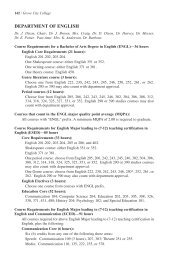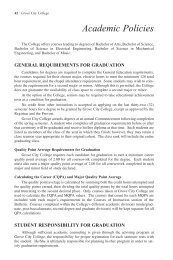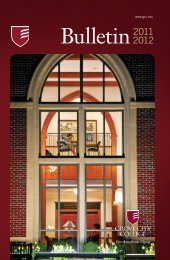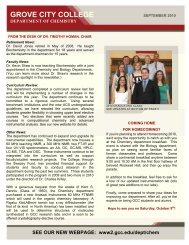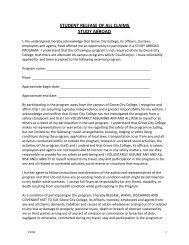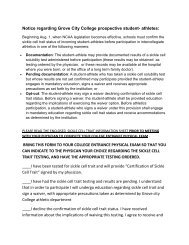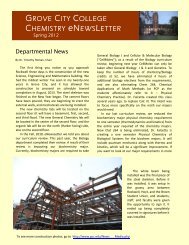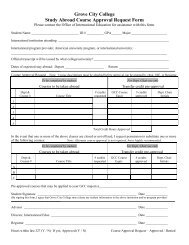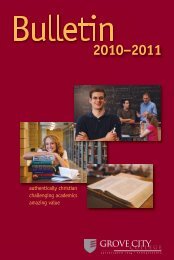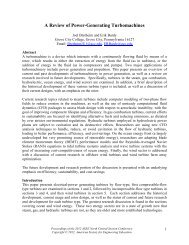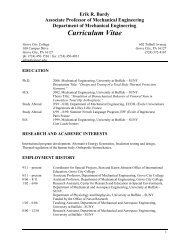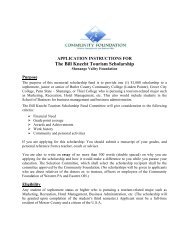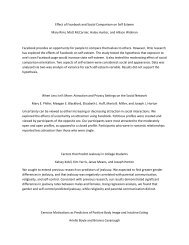2009–2010 - Grove City College
2009–2010 - Grove City College
2009–2010 - Grove City College
You also want an ePaper? Increase the reach of your titles
YUMPU automatically turns print PDFs into web optimized ePapers that Google loves.
96 / <strong>Grove</strong> <strong>City</strong> <strong>College</strong><br />
Social Networks (3 hours):<br />
One course from: Business 420, Entrepreneurship 459; Communication 300 or 459.<br />
Additional Electives (9 hours):<br />
Choose nine additional semester hours in Communication Studies electives.<br />
Business 420 and Entrepreneurship 459 may also count as Communication Studies<br />
electives. The one credit course, Theatre 259, may be repeated, and a maximum of<br />
three hours may count toward the major. A Communication Internship<br />
(Communication 480) may not count as an elective course toward the major, though<br />
Communication 480 grades will be included in the Major Quality Point Average<br />
(MQPA) for Communication Studies majors.<br />
Courses that count in the COMA major quality point average (MQPA):<br />
All courses with “COMM” prefix, BUSA 420 and ENTR 459. A minimum MQPA of<br />
2.00 is required to graduate.<br />
Recommended Electives:<br />
The required courses and electives provide the graduating student a strong foundation<br />
for a career in professional communication, graduate study in communication, or more<br />
effective performance in the career of his/her choice. Additional recommendations include<br />
two-years of language study at the college level and a broad background in Business,<br />
English, History, Philosophy, and Psychology courses.<br />
Students are expected to contact their advisors for a detailed schedule of courses recommended<br />
to meet requirements for a major.<br />
The faculty in the Department of Communication Studies is committed to providing the<br />
opportunities Communication Studies majors and other students need to excel in oral and<br />
written communication. For success in today’s society, information literacy is also a critical<br />
skill. To these ends, Communication 104 is designated as a Speaking Intensive (SI) course;<br />
Communication 212 and Communication 427 are designed as Writing Intensive (WI) courses;<br />
and Communication 104, 207, 212, 305, and 427 address the key issues involved with<br />
Information Literary (IL) and are designated as such. These courses include learning experiences<br />
that are designed to prepare Communication Studies majors to be effective and ethical<br />
producers and consumers of knowledge.<br />
SUPPORTING ACTIVITIES<br />
The Department of Communication Studies offers students significant co-curricular<br />
activities, including:<br />
• The Speech and Debate Team, which participates in both individual events and<br />
group debate.<br />
• Lambda Pi Eta, the undergraduate honor society for Communication Studies students,<br />
sponsors special programs and speakers.<br />
• The Communication Association sponsors speakers and communication-related<br />
events on campus.<br />
• Involvement with the campus newspaper, radio station, literary magazine, yearbook,<br />
or <strong>College</strong>’s Communications Office.<br />
• Internships, whereby students earn academic credit for work done in conjunction<br />
with a professional organization related to communication (e.g., local newspaper,<br />
radio, or television station). See the course description for Communication 480.



